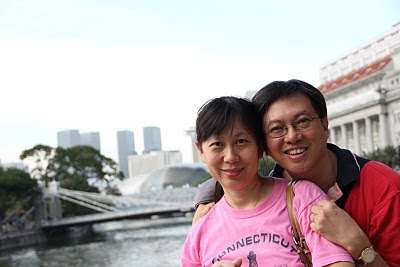I wish for you my friend
This happiness that I've found;
You can depend on God
It matters not where you're bound,
I'll shout it from the mountain top - PRAISE GOD!
I want the world to know
The Lord of love has come to me
I want to pass it on.

My reflection for this Christmas: Two weeks ago on 14 Dec, marks my 25th year as a Christian. I made a personal decision in 1985 when I was still an undergraduate to invite Jesus into my heart… and that was when I really found the true meaning of Christmas…
Not too long ago, a student in her email to me quoted a verse from a favourite book of mine, Tuesdays with Morrie. The quote reads,
"Love wins, Love always wins". The Bible has a somewhat similar verse, which goes “Love never fails…” I pondered over this statement for some time… how does it gel with people who have fallen in and out of love? Many marriages, even those that started with deep love, have failed and ended up in separation and divorce.
Given the worrying statistics on failed marriages, I am truly thankful to God when my wife and I celebrated our 18th wedding anniversary earlier this year. I am convinced we were made for each other... in thewords of Regina Hill, "when God made her, I have no doubt He knew exactly the time and place where we would meet. When He made the two of us, God knew what was good for us." Over the years, we have shared many beautiful moments. We've walked many roads together... we have travelled many roads, mostly smooth... thank God; but there were times when the journey was a lit bumpy as well… Whilst I consciously try my best to be a good husband and friend to her, I’ve had on few occasions made her angry; made her sad; and made her cry… So, after all these years, I have came to the conclusion that … although love never fails, people do… even the best of people will not be able to live up to our expectations all the time.
If it is not found in marriages, then where can we find the kind of love that does not fail? In my life, I have only encountered one kind of love that never fails… I refer to it as the Heavenly Love…. Why? Because it begins in heaven… in the throne room of God… John 3:16 proclaims, “For God so loved the world, that he gave his one and only begotten son, that whoever believes in him shall not perish but have eternal life...” If you think about it, Christmas is actually a heavenly love story that begins with God's love.. thru' the birth of Jesus, God offers us eternal life…. The best decision I have made is to accept the offer by inviting Jesus to be my personal Savior and Lord.
...Christmas Isn’t Christmas
'till it happens in your heart,Somewhere deep inside you
Is where Christmas really starts;
So give your heart to Jesus,
you'll discover when you do
That it’s Christmas
Really Christmas for you.



 (3) The fun days: courtship & romance; playing and dancing .
(3) The fun days: courtship & romance; playing and dancing .













































